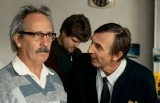
Focus on Canadian Film: Beginning of the 3rd Millennium 2005 / Gaz Bar Blues / Canada 2003
A man nicknamed the Boss and his sons operate at small gas station where a group of locals hangs out. But despite their father’s wishes, the boys have got other ideas about the future: Rejean wants to be a photographer, Guy plays harmonica in a band and Alain is too young to take over the business.


It’s 1989, a year of great events, dislocations and changes, and ‘Boss’ Brochu must face them like everyone else. He and his three sons operate a small gas station in the suburbs of Quebec. It’s the gathering point of a group of local characters, greater and lesser losers. In addition to the repeated robberies, shop-lifting and competition from modern self-service stations, the Boss’s world is threatened by his sons’ unwillingness to fulfil an old world dream: taking over the business one day. The eldest son wants to be a photographer; he takes off to Berlin to document the fall of the Iron Curtain. The middle son often neglects his shifts because of the gigs he plays at local bars with his band. Only the youngest son finds a certain attraction in pumping gas. Despite the tense introductory scene of a robbery in which a shot is fired and the Boss provides commentary, the film unfolds as a classic linear narrative that focuses more on character development and the portrayal of relationships than on formal experimentation or action.
115 min / Color, 35 mm
Director Louis Bélanger
/ Screenplay Louis Bélanger
/ Dir. of Photography Jean-Pierre St-Louis
/ Music Guy Bélanger, Claude Fradette
/ Editor Lorraine Dufour
/ Producer Lorraine Dufour
/ Production Coop Vidéo et les Productions 23 inc.
/ Cast Serge Thériault, Gilles Renaud, Sébastien Delorme, Danny Gilmore, Maxime Dumontier
/ Contact Telefilm Canada, Film Tonic International inc.

Robert Lepage (b. 1957, Quebec) began studying at the Conservatoire d’Art Dramatique de Québec in 1975. Then after a year’s internship in Paris (1978) he began writing, directing and acting for the theatre. He gained fame with his innovative directorial approach to a wide repertoire of plays, and in the 1990s he even directed Shakespeare at London’s Royal National Theatre. In the same period when he founded his multidisciplinary production company Ex machina (1994), he debuted with a writer-director feature, The Confessional (Le confessionnal, 1995), screened at Cannes. In addition to being one of Canada’s foremost men of the theatre, he has shot a total of five films, distinctive for their formal and narrative experimentalism: Le polygraphe (1996), Nô (1998) and Possible Worlds (2000). All of his films have been shown at the Karlovy Vary IFF. For his latest film, The Far Side of the Moon (2003) he won the FIPRESCI Prize at the 2003 Berlinale.
Telefilm Canada
360, rue Saint-Jacques, Suite 600, H2Y 1P5, Montreal, Quebec
Canada
Phone: +1 514 283 636 3
Fax: +1 514 283 236 5
E-mail: [email protected]
Film Tonic International inc.
, H2Y 1R8, Montreal, Quebec
Canada
Phone: +1 514 272 4425
Fax: +1 514 274 0214
E-mail: [email protected]

Brigitte Hubmann
Film Institution Rep.

Louis Bélanger
Film Director

Jean Claude Mahé
Film Institution Rep.
First-hand brews throughout the year.
Be among the first to learn about upcoming events and other news. We only send the newsletter when we have something to say.